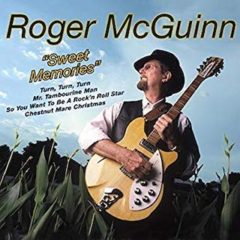
1. SWEET MEMORIES, Roger McGuinn (April First Productions)– If you let Sweet Memories come to you, experience it in sequence and embrace the allure of its serene ambience (don’t fight the feeling), you will hear an artist, one Roger McGuinn, sounding both reinvigorated and completely at peace with himself—reborn, if you will. It’s there in the familiar opening riff from the album opening “Turn, Turn, Turn” (one of three Byrds covers here) as it rolls out peacefully but with fresh urgency in the quavering intensity of McGuinn’s vocal; it’s evident in the selflessness suffusing “Chestnut Mare Christmas,” a sequel to one of McGuinn’s most beloved songs, this version augmented with Marty Stuart’s keening, atmospheric flourishes on the late Clarence White’s fabled B-Bender guitar; it informs the deeply felt spiritual solace he offers in the laid-back testimonies of “Catching Rainbows” and the folk-flavored “Light in the Darkness.” The Rickenbacker 12-string remains a glorious sound, always tastefully deployed, and his commitment to the songs’ messages is manifested in measured, nuanced vocalizing that works its own kind of magic on a listener’s heart. And those screaming girls on “So You Want To Be a Rock ‘n’ Roll Star”? Very cool. -–David McGee
Roger McGuinn offers a short course in ‘Mr. Tambourine Man’ on Woodsongs Old-Time Radio Hour. McGuinn recorded a new version of the Byrds’ first hit on Sweet Memories.

2. LIVE IN EUROPE, Melody Gardot (Verve)– Melody Gardot’s hallmark is intimacy and storytelling. Stylistically, she fuses the raw, febrile emotion of Parisian chanteuse Edith Piaf with the cool coquettish artifice of Peggy Lee and comes up with a unique sound defined by a hushed, torch-song-like delivery complete with a tremulous vibrato. Her approach is often decidedly low key but it’s also high on emotion. Over the course of four studio albums for Decca Records–Worrisome Heart (2008), My One & Only Thrill (2009), The Absence (2012) and Currency Of Man (2015), where she explored jazz, blues, world music, soul and gospel, the latter two albums being highly conceptual affairs springing from her world travels–Ms. Gardot has carved a unique niche for herself as a singer and performer. And she’s scored some hit singles along the way (“Worrisome Heart,” “Who Will Comfort Me,” “Baby I’m A Fool”) and also accrued a big fan base in Europe, where’s she’s racked up several Gold and Platinum albums.
‘Lisboa,’ Melody Gardot in concert, October 2012
It perhaps fitting, then, given the acclaim she’s enjoyed on the continent, that her latest opus presents a clutch of self-curated songs recorded on tour there between the years 2012 to 2016, in locations ranging from Barcelona and Lisbon to Paris, Utrecht, Amsterdam and London. This is not the first time the Philadelphia-raised singer has released live recordings–two EPs, Live In Soho (2009) and Live In Paris (2010), are in her catalogue–but Live In Europe, a double-CD and triple-LP collection comprising 17 tracks, is her first full live album.
As its front cover intimates, Live In Europe reveals Gardot in all her glory–literally, as in naked (from behind) and figuratively, in terms of being a singer and songwriter. The image is arguably a metaphor for what Gardot feels when she walks on stage: exposed, naked, vulnerable; baring her heart and soul in public. But it’s that sense of intimacy with her audience that thrills the singer most of all. She writes in her liner notes that the album, which she curated and compiled herself from 300 performances, is intended as a gift and a thank you to all her fans. Ultimately, what drove her decision to choose the songs that ended up on the finished album was, she wrote, “simply down to the ‘feeling,’ the nostalgia, the memory–it’s not about perfection or ego or demonstration–it’s just about what happens live, because live there is only one element that counts: heart.” Follow this link to Charles Waring’s complete review in UDiscover Music…
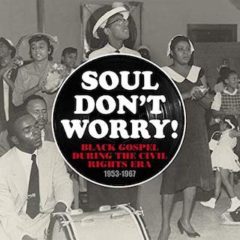
3. SOUL DON’T WORRY! BLACK GOSPEL DURING THE CIVIL RIGHTS ERA, 1953-1967, Various Artists (Narrowly Records)— Soul Don’t Worry is the most ambitious project to date for NarroWay/Gospel Friend, the Sweden-based gospel reissue operation headed by producer Per Notini. In the past, Notini has focused on chronicling individual artists and labels, but this time his focus is on an entire era’s worth of gospel music. And not just any era, but one of the most significant of the 20th Century: the fight for civil rights in America.
Some listeners might read the subtitle and assume that all 47 tracks of this two-CD set are socially significant. The keyword in the subtitle is “During.” While all of the songs contained in this collection were recorded during the Civil Rights Era, not all specifically reference the Civil Rights Movement or specific events during that time.
Nevertheless, because it is part of the producer’s intent to demonstrate the power of song in an era of protest, selections with overt political references naturally populate this project. They include the Friendly Four’s “What is Freedom,” a single snatched from obscurity by Baylor University professor Robert Darden’s work chronicling gospel songs with explicit messages. Songs about the 1963 assassination of President John F. Kennedy are rendered by Little Junior & the Butler-Aires (“Jackie, Don’t You Weep”), Evangelist Rosie Wallace (“Take Courage”), and the Trumpets of Joy of Cincinnati, Ohio (“The News that Shook the Nation”).
‘The Death of Emmett Till, Part 1 & 2,’ Scatman Crothers, one of the rarities from Soul Don’t Worry! Black Gospel During the Civil Rights Era, 1953-1967
“Shout School Children” by Brother Will Hairston of Detroit, arguably the most prolific black balladeer of the 1950s to spotlight social injustice, is about Southern pushback following the U.S. Supreme Court’s 1954 mandate to integrate public schools in Brown v. Board of Education. He even namechecks Autherine Lucy and her effort to gain admission to the University of Alabama.
A different kind of–and exceedingly rare–story song added to the collection is Scatman Crothers’ somber, two-part reading of “The Death of Emmitt Till,” credited to The Ramparts, and one of the first of its type to appear in the Civil Rights Era. Amidst the long struggle for civil rights, “Look How Far We Have Come” by the Hamptonaires invites listeners to reflect on African-American progress since the days of slavery. NOTE: Guido van Rijn has also chronicled politically explicit blues and gospel songs from this period in his Kennedy’s Blues and President Johnson’s Blues books and companion CDs. Follow this link to the complete review by Bob Marovich…

4. A WOMAN’S SOUL, Rory Block (Stony Plain)— Talk about an artist on a hot roll… Blues titan Rory Block has followed her rightly acclaimed “Mentor Series” tributes to blues men that were primary influences on her style with the first in a planned series honoring great blues women of yore. And where else to start but with the Empress of the Blues, Bessie Smith? Backing herself impeccably, evocatively and vigorously on acoustic guitar and bass, as well as providing inspired percussion via a variety of exotic items such as plastic storage tubs, oatmeal boxes, hat boxes, bongos and wooden spoons, Block struts, swaggers and declaims her way through 10 tunes from the Smith catalogue. Never does she try to emulate Smith’s heavyweight champion delivery, but rather finds her own way into songs Smith made her own, losing none of the wit and sass Bessie brought to salacious ditties such as “Need a Little Sugar in My Bowl” and “Kitchen Man,” or the commanding authority needed to make the point in “Do Your Duty.” By contrast, she gracefully conjures epic ache on “Weeping Willow Blues” and is suitably shambling on the rare Smith gospel workout, “On Revival Day,” a number given added heft via Block’s multitracked voice serving as a backing chorus. Leading up to this album, Block’s “Mentor Series” had done justice to the work of Mississippi Fred McDowell, Bukka White, the Rev. Gary Davis, Son House and Skip James, and her recording history is dotted with memorable covers of female blues artists’ songs. But with this hard focus solely on the art of Bessie Smith, she’s kicked it up more than a few notches, making the anticipation of volumes to come all the more delicious to contemplate. Great work here. –David McGee
‘Empty Bed Blues,’ Rory Block, as featured on A Woman’s Soul: A Tribute to Bessie Smith
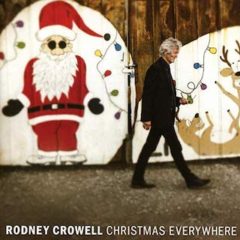
5. CHRISTMAS EVERYWHERE, Rodney Crowell (New West Records)— Not quite achieving Scrooge-level disdain for the Christmas season but neither marveling at silver bells and Santa Claus comin’ to town, Rodney Crowell delivered a decidedly different kind of Yuletide album in 2018, with a bit more of a jaundiced view of the season than is typical of Christmas fare but nonetheless refreshing, if only in justified irreverence. On his website, Crowell explained the genesis and evolution of Christmas Everywhere, and so, as a public service to our readers, we offer this excerpt, in the artist’s own words, as posted on his website. For the full explanatory essay, follow this link; for the abridged version, read on.
In early 2015, I was touring Great Britain as a member of the Transatlantic Sessions when the notion of writing an album’s worth of original Christmas songs began to creep back into my creative process. However, nearly a year passed before I hit on the idea of writing a song referencing one of those tacky, artificial Christmas trees with the tri-colored light wheel that seemed to flood the market in the early Sixties. In the process of composing “Merry Christmas From an Empty Bed,” I sent what I had to Brennan Leigh, then living in Austin,, and asked if she’d write a verse. I was delighted with what she sent back. The Christmas record, I realized, was beginning to take shape.
Sometime around Christmas 2016 I came home to find my granddaughters, Addie and Iris—ages 10 and eight, respectively—sitting side-by-side and playing on our old upright piano a melody that to my ear sounded like something from the early 19th century. I asked what song they were playing and in unison they replied, “Something we just made up.” I hit Record on my iPhone and requested they play it again. Using their melody almost entirely, I spent a couple of months composing the words to “Come Christmas.” A generation had passed since I first made up a Christmas song with their mother.
‘Christmas Everywhere,’ Rodney Crowell (featuring guest vocalist Lera Lynn), the title track from the artist’s first Yuletide release
Sometime later, in rapid succession, I came up with “Christmas in New York,” “When the Fat Guy Tries the Chimney On For Size,” “Christmas For the Blues” and, again with Mary Karr, “Let’s Skip Christmas This Year.” With those tunes in the bag, I began entertaining the rather vague idea of writing something that Spike Jones might have recorded in his heyday. The lyrical ideas for “Christmas Everywhere,” came fast, as did the realization that if I were ever going to realize the song’s compositional possibilities, I would need help from the premier Gypsy Jazz guitarist and composer, John Jorgenson. John and his wife, Dixie, are close friends of mine and Claudia’s and one night after dinner, John and I slipped off to another wing of their house and pulled the complete song together—including the dream sequence in which a child asks Santa for a time machine in which to go back and prevent John Lennon’s murder.
‘Christmas in New York,’ Rodney Crowell, as featured on Christmas Everywhere
I was finally ready to record an album of original Christmas songs. With Dan Knobler producing and some very gifted musicians and vocalists lending their talents, the making of Christmas Everywhere rank with the most enjoyable recording sessions I’ve ever experienced. The record was close to being finished when it occurred to me that to set the tone for the album’s mostly irreverent subtext, I needed to compose a lyrical prelude. In honor of Clement Moore, who wrote the poem we all know as “The Night Before Christmas,” I came up with a short piece called “Clement’s Lament (We’ll See You in The Mall).” Tania Hancheroff and Kim Keyes stopped by the studio and performed the tune with Jordan Lehning’s orchestral backing and the album was pronounced complete.
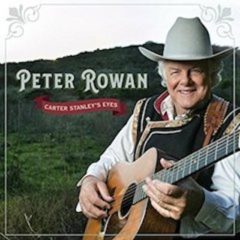
6. CARTER STANLEY’S EYES, Peter Rowan(Rebel)– If any artist belongs in Deep Roots, it’s Peter Rowan. For the past few years Rowan has been on one powerful journey exploring his deepest roots, and on Carter Stanley’s Eyes he stays the course, as stirring as ever. This new album follows the 2017 surprise he gave us with My Aloha!, in which he explored the links between traditional Hawaiian music and bluegrass. Immediately preceding that album, his challenging Dharma Blues—part of a triptych of albums revelatory of what I declared to be an “intensely interior, deeply personal journey” producing the most personal songs of his storied career. (Dharma Blues was a Deep Roots Album of the Year in 2014.) Naturally, those songs were mostly bluegrass, but there were also tips of the hat to Rowan’s folk, progressive bluegrass and country-rock roots along the way.
‘Let Me Love You One More Time,’ written by Ralph Stanley, featured on Peter Rowan’s Carter Stanley’s Eyes
On Carter Stanley’s Eyes, Rowan revisits the the beginning of his professional career, when as a teenage phenom he was befriended by Bill Monroe and the Stanley Brothers. Upon being introduced by Monroe to Carter Stanley, the latter asked the young picker, “Are you going to stick with it, son?” We know the answer was yes, and we know also how profoundly Rowan has continued to respond to Carter’s question throughout his career. On this outing Rowan brings the past and present together seamlessly and soulfully, paying homage to the Stanleys in three of their original numbers, while elsewhere doing more than justice to tunes by the Louvin Brothers (a sensitive treatment of “A Tiny Broken Heart” with a smooth, crooning vocal oddly heightening the tragedy of a farm being foreclosed and with it a seven-year-old losing his little playmate); Bill Monroe (a haunting rendition of the heartbreaking ballad, “Can’t You Hear Me Calling,” with a stirring mandolin solo presumably from veteran Don Rigsby, of Ralph Stanley’s Clinch Mountain Boys); Ralph Stanley, via a sprightly, banjo-fired workout (courtesy Rowan band member Patrick Sauber, one of the album’s younger generation bluegrassers effortlessly meshing with the vets) on “Let Me Love You One More Time,” an earnest farewell to a beloved paramour on the eve of her wedding to another, a tune that also benefits from lively fiddle (Blaine Sprouse, also a former Blue Grass Boy) and mandolin solos. Follow this link to the complete review by David McGee…

7. LOVE LIVES ON, Dana Fuchs (Get a Long Records)– In recent years Dana Fuchs has experienced the high of her first child’s birth and the soul crushing deaths of her brother (from brain cancer) and her father (years earlier she had lost her sister to suicide). With every right to explore despair in song, she has instead chosen the path of, as she says, “hope and redemption,” resulting in as powerful an outing as her 2011 breakout album, Love to Beg. Herein she delivers performances of spiritual depth and tender, soulful nuance but with no diminution in her electrifying energy. Recorded in Memphis with some legendary Stax players fashioning a rich, slinky, southern soul groove, Love Lives On features as its horn-enhanced title track a grinding, tortured soul ballad dissecting love’s enduring grip even as it fades; a jaunty acoustic blues celebrating self-affirmation and survival in “Fight My Way”; and “Callin’ Angels,” a celebratory horns-and-organ-fueled plea for divine guidance in her life’s journey. One notable cover: an acoustic-based, blues-tinged version of “Ring of Fire” closer in spirit to Anita Carter’s original, understated recording than to Johnny Cash’s classic rendition, which in fact deployed horns as strikingly as Ms. Fuchs does everywhere but here. I guess things happen that way. –David McGee
‘Love Lives On,’ Dana Fuchs, performing the title song from her latest album
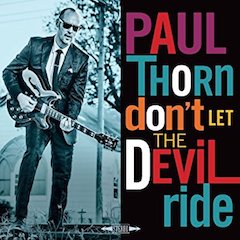
8. DON’T LET THE DEVIL RIDE, Paul Thorn (Perpetual Obscurity Records)– Paul Thorn’s Don’t Let the Devil Ride hits the Americana music jackpot bit time. With guest vocalists on the order of the Blind Boys of Alabama and the McCrary Sisters, and the Preservation Hall Horns among the musicians, and having recorded it all down south (in Muscle Shoals, at Rick Hall’s Fame studio; in Memphis at Sam Phillips’ studios; and in New Orleans at Preservation Hall, Thorn could have performed “Happy Birthday to You” and it would have sounded smothered in tangy BBQ sauce.
On this, his first gospel album, Thorn taps his sacred roots (his father was a bishop in the Church of God of Prophecy, a Pentecostal denomination) as well as his abiding affection for African American gospel music, and especially Kevin Nutt’s Sinner’s Crossroads radio show on WFMU, to showcase gospel and spiritual staples done with profound respect for the originals. Follow this link to the complete review by Bob Marovich…
‘You Got to Move,’ Paul Thorn, from his Don’t Let the Devil Ride album, a live performance featuring the McCrary Sisters
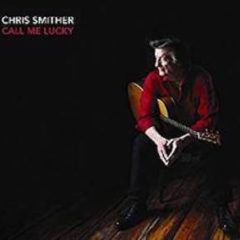
9. CALL ME LUCKY, Chris Smither (Signature Sounds)– On this, his 18th long player, his first in six years, Chris Smither emphasizes—then re-emphasizes–the irony of the collection’s title. Backed by a tight, rootsy quartet, Smither contemplates his own relationship failures in humorous, self-deprecating fashion in the shambling “The Blame’s On Me” but later takes it all in existential stride in the carefree shuffle of “Too Bad, So Sad.” Feeling disoriented as age creeps up on you? The eerie, swirling soundscape of a bluesy ballad, “Down to the Sound,” perfectly shadows the artist’s wearily articulated particulars of experiencing splintered internal reality. Then there’s the surprise of Chuck Berry’s “Maybelline,” brisk, fingerpicked but positively foreboding when delivered as a blues dirge. These and six others comprise the A Side of this double-CD set; Side B, as it’s called, lays on the angst by reimagining five of Side A’s numbers but in darker, chamber song fashion, along with a version of Lennon-McCartney’s “She Said She Said,” transformed into a spooky, medieval sounding folk tune evoking Brian Jones-era Stones. Through it all, Smither sounds very live and abundantly present in the mix. But lucky? Debatable, to be sure, in light of this transcendent artistry. -–David McGee
‘She Said, She Said,’ Chris Smither reimagines the Revolver era-Beatles’ tune on his Call Me Lucky album

10. STAND THERE, The Wardlaw Brothers (TWB Records/New Day)– The five Georgia-born and -raised sons of the Rev. Carl Wardlaw Jr. have, on their fifth album, honored their father’s love of classic group harmony and honored their Father at the same time. With a scintillating blend of Boyz II Men-Take6-Winans vocalizing, the brothers offer a primer in honoring and leaning on God’s love in getting through hard times—a message tailor-made for the present day. How they get over is where it gets interesting, as the arrangements range from anguished piano blues-based testimonials of salvation and redemption such as “God Has Kept Me” to rich group harmony philosophizing on the order of “Stand There,” complete with contemporary praise-and-worship electronic flourishes. The Take6 influence is profoundly evident in the cascading a cappella harmonies of the concise (1:07 in length) praise song “Everything to Me,” whereas the hip-hop rhythms, testifying lead vocal and fresh take on call-and-response in “Don’t Ever Leave Me” emerge from an understated country-based guitar intro. After all this, Martin Luther Wardlaw closes with the rousing “Lean on Him,” a traditional, exultant paean to the power of prayer, seemingly rooted in his personal experience with the Word. Not a believer? Keep your options open. –David McGee
‘Stand There,’ The Wardlaw Brothers, the stirring title track from the group’s latest album
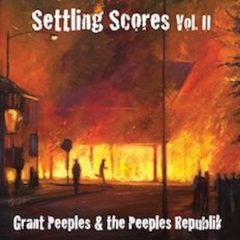
11. SETTLING SCORES VOL. II, Grant Peeples & the Peeples Republik (Gatorbone)— You would think this day and age would generate far more protest music than it has. Which is not to suggest that this gem of an album—the fourth Peeples release to be produced by Gurf Morlix (a credit that in and of itself ought to get your attention) —is all Sturn und Drang, although Peeples’ music does have much in common with that 18th Century German literary movement. This holds true for both his outrage at the disturbing state of our Republic in the Trump era and for the depth of Peeples’ romantic sensibility. So on the one hand you get “This Could Be a Long Night,” a cool, bluesy, quite wry manifesto warning of our social contract being shredded on a daily basis (“everything you ever cared about/everything you thought you’d never doubt/all of this could be driven out/and it could be a long night…”), but on the other you get a spare, lovely cover of Steve Earle’s “Goodbye,” featuring a tender supporting vocal by Jaimee Harris, as well as an equally touching lover’s ode, “Llliana,” an update of one of Peeples’ earliest songs replete with the plainspoken poetry and detailed images common to Tom Waits’s most affecting tunes in this spoken-sung style (it also benefits atmospherically from a subtle, nuanced violin solo by Tim Higgins). Putting the capper on this impressive effort is the artist’s revision of Dylan’s near-13-minute “Brownsville Girl” (which itself began life as a Dylan-Sam Shepard co-write, “New Danville Girl,” which itself borrowed from Woody Guthrie’s “Danville Girl”), which Peeples’ has, as he writes in the liner notes (must reading if you want to understand the twisted, tangled roots of Dylan’s song), “boiled out of it (and injected into it) my own story.” This too, much like the other socially conscious numbers here, is not altogether despairing—remember, in the sentiment “it could be a long night,” the modal verb “could” carries with it the possibility of change for good as well as for ill, depending on the roll of the dice. Sounding like the mutant son of Billy Joe Shaver and Guy Clark, Grant Peeples is an artist with something to say, and he’s saying it in not as a polemicist, but rather as a poet. Attention must be paid. –-David McGee Follow this link to Grant Peeples’ website for more information and tour dates.
‘More for Us, Less for Them,’ Grant Peeples, from Settling Scores Vol. II
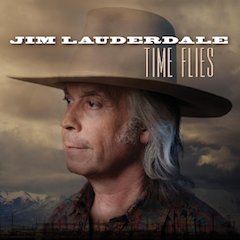
12. TIME FLIES, Jim Lauderdale (Yep Rock)– Jim Lauderdale is a steady geyser of Americana, releasing over two dozen solo albums and collaborations and writing for and with many mostly country musicians–from George Strait to Rodney Crowell, from the Dixie Chicks to George Jones–at a steaming pace. He shows up in so many places as a solo artist and as a songwriter that you wonder when he has time to sleep.
Being prolific, however, would not mean much if Lauderdale’s songwriting and singing weren’t consistently outstanding, as Time Flies demonstrates in abundance. The first half of the album explores classic and contemporary country sounds by way of the melancholy title track, the environmentally conscious “The Road Is a River,” the Willie Nelson-like “Slow As Molasses” and “When I Held the Cards,” a tear-jerker of a hard-luck story.
Live at the Stoltz Listening Room in Easton, MD, on November 1, 2018, Jim Lauderdale performs environmentally conscious song ‘The Road is a River,’ from his latest solo album, Time Flies
Live at the Stoltz Listening Room in Easton, MD, on November 1, 2018, Jim Lauderdale performs “Time Flies,” the title tune from his new album
There’s even more variety later, including the noir-ish “Wearing Out Your Cool” (complete with a sax solo), and two swinging numbers in “Wild on Me Fast” and “While You’re Hoping,” with echoes of Leon Russell and Dr. John along with name-checks of cultural icons from Cleopatra to Monet. With top-notch backing from guitarist Chris Scruggs and bassist Jay Weaver, Time Flies continues Lauderdale’s prolonged streak of unfailing quality, memorable songs and great performances. Follow this link to the complete review by the AP’s Pablo Gorondi
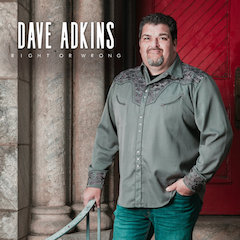
13. RIGHT OR WRONG, Dave Adkins (Mountain Fever Records)— Right or Wrong offers everything that has propelled Dave Adkins into contemporary bluegrass music’s hierarchy. The album kicks off in high gear with “Blue Blue Rain”—a surefire hit with fans who lean more toward the traditional side of bluegrass. Following suit are “Him and West Virginia,” “Roll Little River” and the album’s first single, “Blood Feud (Hatfields & McCoys),” a duet/co-write with Larry Cordle that reached #1 on Bluegrass Today’s Top 20 Songs chart. But beyond the traditional sound that Dave presents so well on this new album are some real gems that touch the heart and reveal his tender side. “Goodbye Caroline” is so melodically beautiful that you almost forget it’s a song about leaving. And “I Can Only Imagine,” a remake of the popular song first recorded by Christian rock group Mercy Me, is anything but a copy of the original. Dave effectually delivers each lyric with true believability, poignance and heart.
As with all of Dave’s earlier releases, Right or Wrong showcases his craft as a songwriter, but the album also spotlights the gifted songwriting community he draws from and is part of. Jerry Salley, Eli Johnston, Blake Grisham, Greg Preece, Bart Millard, Terry Foust, Mitchell Brown, Carl Caldwell, Craig Lackey, Kenneth Johnson, Ray Bruce, Daniel Salyer, Dave Morris, and Dawn Kenney all lent their artistry to making this project as powerful as it is.
‘Blood Feud (Hatfields & McCoys),’ Dave Adkins, with additional vocals by Larry Cordle, as featured on Right or Wrong
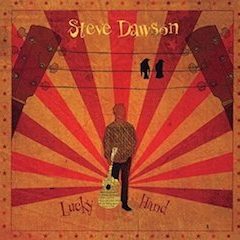
14. LUCKY HAND, Steve Dawson (Black Hen Music)– Steve Dawson’s eighth album, and his first collection of instrumental music since 2014’s Rattlesnake Cage, showcases the artist’s brilliant fingerstyle work on a variety of instruments, accompanied by special guests Jesse Zubot on violin, harmonica legend Charlie McCoy and mandolinist John Reischman, as well as the presence of a string quartet on a number of tracks.
The scope of Dawson’s musical voice broadens to take on a cinematic quality, as he deploys his guitar to sketch aural paintings and create tapestries of sound. Recorded live off the floor, with up to a dozen microphones in various positions throughout the large studio space to capture the guitar and orchestration, Lucky Hand represents the ideal intersection of the primitive and the modern that has fascinated Dawson for so long.
‘Bentonia Blues,’ Steve Dawson, as featured onLucky Hand
Comprisedof 10 instrumental tracks of solo, duo and full-bodied string quartet works, Lucky Hand‘s music is sweeping, dynamic and visually evocative throughout. Enlisting Jesse Zubot in the project to create complementary and adventurous arrangements for his guitar excursions, Dawson delivers completely realized compositions, enhanced by Zubot’s orchestrations adding color to the sepia-tinged melodies.. 2018 marked 20 years since Zubot and Dawson teamed up, and their collaborations remain inspired and inspiring.
Dawson’s records typically feature a wide array of stringed instruments, and Lucky Hand is no exception. His artistry on the six- and 12-string guitars shimmers throughout, while the track “Bugscuffle” showcases his unique tuning and voice on the Weissenborn lap guitar. “Bentonia Blues” features a thrilling duet between Dawson’s National Steel Guitar and McCoy’s harmonica. Gorgeous interplay abounds as his guitar converses with John Reischman’s mandolin on “Little Harpeth.” At times it’s hard to tell where Dawson’s guitar begins and Reischman’s mandolin ends. A truly masterful performance, it’s but one of many breathless, transcendent moments Lucky Hand offers. (Courtesy Marc Pucci Media)
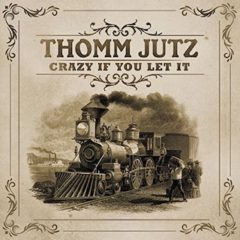
15. CRAZY IF YOU LET IT, Thomm Jutz (Mountain Fever Records)— To anyone who’s been paying attention to album liner notes this decade, Thomm Jutz’s name is already familiar. Jutz is a Nashville-based songwriter, producer, sideman and singer with a list of credits growing lengthier by the day, it seems. He has written numerous popular bluegrass songs (“Carolina Wind” with Irene Kelley, “Forty Acre Blues” for the Darrell Webb Band and “Walking In The Blue Ridge” for Junior Sisk), produced Nanci Griffith’s excellent The Loving Kind and with Peter Cooper, guided, wrote and produced the exceptional Mac Wiseman homage, I Sang the Song. If that wasn’t enough, the German-born Jutz also created the three-volume The 1861 Project,comprised of new songs focused on lives impacted by the Civil War.
Having recorded a handful of collaborative albums, Crazy If You Let It is Jutz’s third solo release, but the first to receive widespread distribution. With strong roots in country and folk music sounds, this is essentially a modern bluegrass album but the truth is it defies rigid categorization. Americana, then?
‘Crazy If You Let It,’ Thomm Jutz with Andrea Zonn on the title song from his new album
The spirit of American history is woven into many of the songs including “Old Railroads,” an evocative song with The Steeldrivers’ Tammy Rogers telling of someone “stuck on those old trains.” “Confederate Jasmine,” co-written with Jefferson Ross, evokes the country’s past, while old-time fiddle giant Charley Poole serves as the inspiration for “Atlanta (Please Don’t Let Me Down),” a gentle blues co-written with Jon Weisberger. Follow this link to the complete review by Donald Teplyske in Country Standard Time…
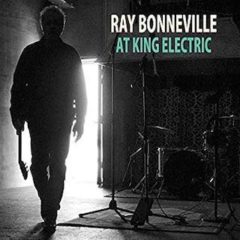
16. AT KING ELECTRIC, Ray Bonneville (Stonefly Records)– Ray Bonneville, native of Quebec, rivals another Canadian songwriter of note, Robbie Robertson, in possessing a deeper sense of American iconography than most Americans. In a recording career dating from 1992, Bonneville, having found fellowship with our land and with its people, has pulled from both stories that linger in memory, and grow more resonant in time. His song “I Am the Big Easy,” written to celebrate the indomitable soul of New Orleans in the wake of Hurricane Katrina, remains among the most memorable missives offered in the wake of a national tragedy. Now based in Austin, Bonneville hit a high-water mark in 2018 with his At King Electric album—clearly, getting older means getting better for this artist, who never repeats himself, but always arrives with an arresting point of view of life in our times, no matter the tenor of the times. —David McGee
Ray Bonneville’s spartan lyrics evoke images of freight yards, open prairies and empty dwellings. His masterful, moody songs on At King Electric embody the spirit of the North American continent he has wandered for decades.
This, his ninth studio album, is a collection of bluesy folk songs whose sparing, haunting lyrics might draw comparisons to Guy Clark, at times Tom Waits and at others Johnny Cash. He also brings to mind Twangville friend Kevin Gordon (and looks like what Gordon might look like in 20 years). Bonneville has some really nicely written songs on At King Electric, including “Next Card to Fall,” “Codeine,” “Tender Heart,” “South of the Blues,” and “Papachulalay.” One gets the feeling there are a lot of miles behind these songs.
Though comfortable working alone, Bonneville is backed by a full band on At King Electric, with Richie Lawrence on electric piano and accordion, Andre Bohren on percussion and piano, and guest appearances by guitarist Gurf Morlix and organist Stefano Intelisano. Follow this link to the complete review by Bill Wilcox, posted at Twangville
‘Next Card to Fall,’ Ray Bonneville, featured on At King Electric
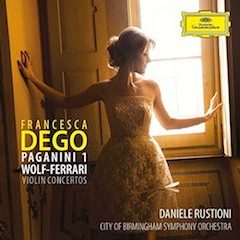
17. PAGANINI 1; WOLF-FERRARI VIOLIN CONCERTOS, Francesca Dego, City of Birmingham Symphony Orchestra (Daniele Rustioni, Conductor) (Deutsche Grammophon)–In a time when children are being gunned down in their schools and nations are hurtling towards war over differences of negligible consequence to the daily lives of their citizens, it feels inappropriate even to think of artistic tragedies. The sobering realities of politics and the evolution of culture are now more indivisible than ever before, however, and the struggles of art and artists are often educational on a broader level. Ironically, music as a commodity is accessible to 21st Century listeners in ways of which previous generations could hardly have dreamed, but music as a common language allowing, even encouraging, civil discussion of humanity’s troubles is understood by ever fewer artists and listeners. Counterintuitive as it may seem, joy is the critical accent now so often missing from serious musical discussions. A serendipitous peculiarity of music is that, whether the emotions it communicates are exuberant or funereal, the most effective performances are those exuding the joy of using music to connect people. Absent this elation, the most accomplished technique cannot transcend the mundane: rather than hearing music, the listener perceives notes. The musician completes a task like any other commonplace chore, and Saint Cecilia is martyred anew.
Paganini: Violin Concerto No. 1 in D Major, Op. 6, MS.21-3. Allegro spiritoso, Francesca Dego and the City of Birmingham Orchestra conducted by Daniele Rustioni. From Paganini 1: Wolf-Ferrari Violin Concertos.
In her previous recordings of solo and chamber works, violinist Francesca Dego has exhibited the pure delight in making music that uplifts an artist’s work and audiences’ reactions to it. Born in Lecco in Italy’s Lombardia region, Dego’s prodigious talent was apparent from an early age, her concert début at the age of seven having revealed a fledgling interpretive acuity she continues to refine. A student of prestigious violinists and institutions, she perpetuates traditions encompassing fellow artists as diverse as the composer and violinist George Enescu and Ferdinand David, to whom Felix Mendelssohn dedicated his Violin Concerto. That she is a committed, thoroughly-prepared musician and an alert, insightful artist is consistently apparent, but the quality that makes these recorded performances of concerti by Niccolò Paganini and Ermanno Wolf-Ferrari equally enjoyable and valuable is the unmistakable sense of felicity that her playing of even the most contemplative passages in these works imparts. Follow this link to the complete review by Joseph Newsome in Deep Roots…
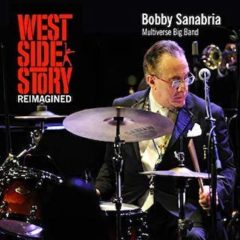
18. WEST SIDE STORY REIMAGINED, Bobby Sanabria Multiverse Big Band (Jazzheads)—West Side Story never seems to age. In every era following its Broadway opening in 1957, something is going on culturally to make the themes of this groundbreaking musical (inspired by Shakespeare’s Romeo and Juliet), with music by Leonard Bernstein and lyrics by Stephen Sondheim, ever timely. So it was in 2018, with the proceeds from this Latinized “reimagined” version by the Bobby Sanabria Multiverse Big Band slated for Puerto Rican hurricane relief. This refreshing approach to a score deeply ingrained in America’s musical psyche would merit the album’s inclusion on the Elite Half-Hundred of 2018, but when you couple the project’s musical vision to its charitable purpose, you have a big winner. Recorded live at Dizzy’s Club Coca-Cola in New York City in 2017—the 50th anniversary year of the original Broadway production’s opening—West Side Story Reimagined stands proudly beside the original cast album and the 1961 movie soundtrack as the most moving, and the most exciting, of the many takes on the original score over the past half century. –-David McGee
‘Maria,’ Bobby Sanabria Multiverse Big Band, from West Side Story Reimagined, an album benefitting Puerto Rican hurricane relief
For those who thought that nothing more could be said or written about [West Side Story], drummer Bobby Sanabria and his New York-based Multiverse Big Band offer a scintillating reappraisal from a Latin perspective on its fiftieth anniversary, infusing the score with rhythms and accents that Bernstein, in spite of his vast musical knowledge, perhaps never even knew existed. These include, among others, the bomba xica, joropo, bembe, bomba yuba, samba-cancao and son montuno. As a result, Bernstein’s impressive score sounds even fresher and more lively than ever. The lovely ballad “Maria,” which opens the “Second Act” of this two-CD set, is singularly transformed, using African bembe rhythms, Nigerian/Yoruban ceremonial drums and forceful chants by Sanabria and the ensemble to underline its amorous theme.
That, however, is but one example among many, as arrangers Jeremy Fletcher, Niko Siebold, Jeff Lederer, Matt Wong, Danny Rivera, Eugene Marlow, Andrew Neesley and Takao Heisho let their imaginations run free to lend the entire score a 21st century carriage and tenor. Trumpeter Neesley, baritone saxophonist Rivera and percussionist Heisho double as members of the ensemble. Fletcher’s aggressive arrangements of the “Prologue,” “Gee, Officer Krupke,” “One Hand, One Heart,” “Somewhere” and “Epilogue/Finale” are especially effective. … Indeed, everyone plays a pivotal role in bringing Sanabria’s vision to life—and that of course includes the superb Multiverse ensemble, which never misses a beat in a performance recorded live at Dizzy’s Club Coca-Cola in the Big Apple with proceeds earmarked for Puerto Rico hurricane relief.
There is a modest trade-off here in that Sondheim’s memorable lyrics have fallen by the wayside, but the band more than compensates for the loss with its irrepressible ardor and unflagging fidelity to Bernstein’s marvelous score. Sanabria introduces the “Epilogue” with an eloquent plea for peace and understanding, and afterward takes time to introduce everyone in the 20-member Multiverse band. The audience at Dizzy’s clearly loved and appreciated the performance; chances are you will too. Follow this link to the complete review by Jack Bowers posted at All About Jazz.com
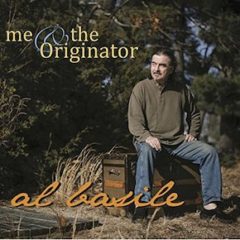
19. ME & THE ORIGINATOR, Al Basile (Sweetspot Records)— Never mistake Al Basile for your average bluesman or jazzman. Nothing about Al Basile is average, whether it was his tenure as Roomful of Blues’s first cornet player or with the written word—he has a Master’s in Creative Writing from Brown University, has published two books of poetry and has won the Meringoff Award from the Association of Scholars, Critics and Writers for his poem “Tonesmith.” On the 20th anniversary of his Sweetspot label, Basile has delivered a blues concept album inspired by the running narrative on Louis Armstrong’s My Musical Biography. Each of its dozen songs is preceded by a spoken narrative; collectively, these narratives tell the story, as Basile says, “about blues songs—how they came to be, who can claim them as theirs, that speaks to the history of the music as we’ve inherited it.” The central character is introduced as a boy rebelling against authority and trying to find his own way in the world: for instance, running away from home and “learning how to press on, holding my breath” in “What He Carried” leads into the swinging, horn-driven “My J-O-B,” featuring Basile’s rousing cornet solo over the driving arrangement. On the tender side, a woman, claiming to be a healer proves to be true to her word in the grinding, B.B. King-styled ballad, “She Made Me Believe It,” and there’s also a side trip into the baseball world in “Lefty’s Nine Lesson,” a tall tale inspired by the life and career of turn-of-the-20th-century premier power pitcher Rube Wadell, with Basile adding a bright, majestic cornet solo in powering the arrangement along. Duke Robillard does his usual on-point production in crafting a full, rich sound for the band while also contributing on guitar along the way; Basile’s stellar backing mates include Mark Texeira (drums), Bruce Bears (keyboards), Brad Hallen (bass), Doug James (tenor sax) and Jeff “Dock” Chanonhouse (trumpet). In short, Me & The Originator continues a trend of Al Basile’s albums always being unadulterated triumphs of concept and execution informed by the artist’s undaunted, unquenchable soulfulness. And like many Basile albums, the more you listen to this one, the more you hear. It’s rich, on many fronts. –David McGee
‘She Made Me Believe It,’ Al Basile, featured onMe & The Originator
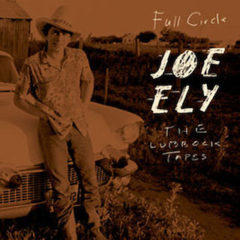
20. FULL CIRCLE: THE LUBBOCK TAPES, Joe Ely (Rack ‘Em Records)– When the Clash started kicking around with Joe Ely in the late ’70s, they were drawn to this West Texas wild card who didn’t like rules. Ely was a singer-songwriter from Lubbock (by way of Amarillo), which meant he fit in quite naturally with the outlaw country movement that had emerged with his Austin neighbor Willie Nelson at the forefront. But Ely was also drawn to honky tonk, rock, Tex-Mex, Cajun and Beat literature, and didn’t much think of or care about music as a business.
Full Circle: The Lubbock Tapes documents the artist’s formative years as a solo act. After his one-of-a-kind band, the Flatlanders, imploded, Ely ran off and, literally, joined the circus: he took care of llamas, stallions and “the world’s smallest horse” for Ringling Brothers and Barnum & Bailey. After one of his charges kicked him and broke three ribs, he returned to Texas to recover and there began working on songs, some of them written by his old Flatlanders pal Butch Hancock.
‘Because of the Wind,’ Joe Ely, a gem from Full Circle: The Lubbock Tapes
“The Lubbock Tapes” is drawn from two demo sessions. The first, in 1974, shows Ely in thrall to honky tonk, putting his own twist on the type of two-steps that would keep a crowd dancing on the sawdust floor of a big Texas roadhouse. Curley Lawler from Western Swing giants Bob Wills and the Texas Playboys adds violin to “Winds and Waterfalls,” and it’s just fine for what it is, but not truly distinctive. Where Ely really made his mark is with songs such as Hancock’s “Standin’ at a Big Hotel,” in which a drifter much like Ely meets his match “in the wilds of Hollywood.” With its surreal twist on Western outlaw mythology, the song caught the ear of established hitmakers such as Jerry Jeff Walker, among others, and earned Ely a long look with the major record labels seeking to make their mark in the expanding country market. Follow this link to Greg Kott’s complete review in the Chicago Tribute

21. BETTER PART OF ME, Dulcie Taylor (Black Iris Records)– Perhaps after 18 years and seven albums, singer-songwriter Dulcie Taylor’s time has arrived. The South Carolina native (transplanted to California) keeps making interesting records and taking artistic chances, with Better Part of Me being her most challenging, and most deeply satisfying, album yet. Its striking, immediate sonics lend body to arrangements fleshed out by cellos and orchestral parts complementing exotic flourishes provided by Cajons, dulcimer, mandolin and electric and acoustic slide guitars. That’s the music. In her lyrics Taylor is edging, angrily, into topical territory with the roiling “Halfway to Jesus,” wherein she issues a heated plea that people take action to save the planet from extinction by climate change. Elsewhere, the artist leans into her strengths in poignant dissections of matters of the heart. The dreamy title track celebrates a love affair at its most fulfilling; co-producer (with Taylor) George Nauful’s syncopated guitar solo adds an almost mocking commentary to the singer’s expressions of romantic angst in “Watch Me Hurt”; in contrast, acoustic piano and a pair of cellos fashion a consoling backdrop to the revealing introspection of the lovely “Dove Crying in My Window.” Memorable work throughout. –-David McGee
‘Better Part of Me,’ Dulcie Taylor performs the title track from her latest album

22. A HEART NEVER KNOWS, The Price Sisters (Rebel Records)– Hailing from Monroe Country, Ohio—“the very heart of Hatfield-McCoy territory,” as the liner notes observe—Price Sisters Lauren and Leanna not only step boldly into a rich history of bluegrass sibling duos but may also have lessons to impart about teleportation, so authentic is their otherworldliness. With the redoubtable Charlie Cushman leading the charge on banjo, the sisters kick off the setlist with Bill Bryson’s sprightly ultimatum, “Love or Leave Me,” spiced by Lauren’s tasty mandolin solo at the halfway mark; Cushman re-emerges to set the tone for a midtempo meditation on A.P. Carter’s heartwarming “You’ve Been a Friend to Me,” featuring backwoods atmospherics courtesy Lauren’s fiddle and Leanna’s mandolin, with the sisters’ lush harmonizing lingering in memory; this then segues to a keening country heartbreaker, Shawn Camp’s “If I’m Gonna Be Lonely”—all done so thoroughly in the Price’s style you’d never know they hadn’t written them yesterday. Some sounds, some sentiments, never go out of style. Follow this link to the complete review…
‘Widow of the Mountain,’ written by MaryBeth Zamer and Mike T. Lewis, aka the Twangtown Paramours, as performed by the Price Sisters on A Heart Never Knows
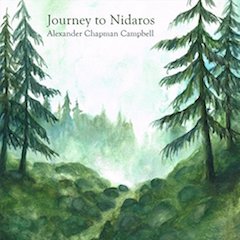
23. JOURNEY TO NIDAROS, Alexander Chapman Campbell (Alexander Chapman Campbell)— Journey to Nidaros presents a sequence of nine piano pieces by the young Scottish composer/pianist Alexander Chapman Campbell, issued on his own label. The music describes a journey through Norway that Chapman Campbell undertook in 2015, walking from Oslo to historic Nidaros Cathedral in Trondheim. Rather than being a reflection on a John Muir-like journey into the quietude and beauty of nature, the pieces actually were written during the journey. In an incredible turn of events, Chapman Campbell explains in his CD liner notes how he came upon pianos by accident (apparently pianos sit in the most unusual places in Norway) and began merging musical ideas as he strolled through Norwegian forests.
Each piece describes a particular moment along the way from the start at home through to the latter part of the journey, focusing on the wilds and the solitary aspects of such a walk. In toto he wrote nine pieces, each around four or five minutes, making a total of 40 minutes. Follow this link to Robert Hugill’s complete review in Deep Roots…
In this short documentary, Alexander Chapman Campbell explains his 2015 walk along the ancient Norwegian pilgrimage route for Oslo to Nidaros Cathedral, a jaunt on which he intended to enjoy solitude, wilderness and time away from composition. Unexpectedly, the journey became an increasingly musical one, and a new collection of solo piano music emerged, Journey to Nidaros.

24. SONGBIRDS & ANGELS, Renee’ Austin (www.reneeaustin.org)– In 2005, blue-eyed blues and soul songstress Renee’ Austin was a rising star in the music business. She had signed a record deal with Blind Pig Records, shared the stage with top charting artists, and was featured in an acclaimed PBS special, Blues Divas, hosted by Morgan Freeman.
Shortly thereafter, Austin found a lump in her throat and had it surgically removed. The result left her with a paralyzed left vocal cord and a diagnosis of never being able to sing again.
An understandably heartbroken Austin released a tear-stained letter informing her fans of her condition being pronounced permanent, but she never stopped praying for a miracle. Lo and behold, in time she regained her speaking voice, and later received the miracle she was praying for—the return of her singing voice, “lower and with no range,” as she said. That too turned out to be a temporary condition. And here she is.
‘Songbirds & Angels,’ Renee’ Austin, the title track from her debut Christian album
On Songbirds & Angels, her first post-surgery CD and her debut Christian album, Austin employs her gutsy blues voice to squeeze every emotion out of the 13 songs she wrote for the project. Follow this link to the complete review by Bob Marovich in Deep Roots…
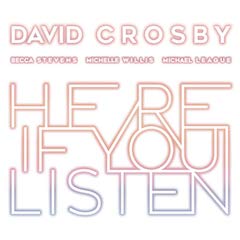
25. HERE IF YOU LISTEN, David Crosby (BMG)– Thoughtful, introspective, serene and reflective, David Crosby continues his late-career resurgence with a dozen songs wherein the past bleeds into the present and fatalism is tempered by graceful acceptance of the inevitable. “Truth I give you my child/to take on your own ride,” he sings in a soft, plaintive voice in “Your Own Ride,” a less didactic “Teach Your Children” suggesting coping mechanisms for a younger generation. The spare, chamber-like sonics provide an elegiacal backdrop for stark guitars and ethereal backing vocals provided by returning Crosby collaborators Becca Stevens, Michelle Willis and Michael League (collectively known as the Lighthouse Band). Dark humor abounds in the plainly bogus self-criticism Crosby jauntily admits in “I Am No Artist” (lyrics by the late poet Jane Tyson Clement) but eerie, impressionistic musings such as “Other Half Rules,” all silky, jazzy harmonies intertwining with chiming guitars, convey a murky sense of relationship complexities. In a nice touch, Crosby concludes the festivities with a tender, acoustic guitar-and-vocals treatment of “Woodstock,” less an homage to his past than a heartfelt tribute to his ailing ex-, Joni Mitchell—the most touching of many touching moments Crosby delivers here. ––David McGee
‘Your Own Ride,’ David Crosby, as featured on Here If You Listen
Follow this link to the Deep Roots Albums of the Year, 2018
Follow this link to the Deep Roots Elite Half-Hundred of 2018, Pt. 2


